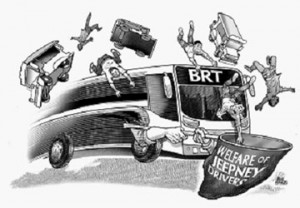Watch the BRT take shape

Can you blame jeepney drivers and operators for looking at the World Bank-favored scheme as a threat to their existence?
At this stage, the feasibility study into the new setup has settled on Osmeña Boulevard as one of the main routes.
The dedicated bus lane will run from Bulacao to Ayala Center via Cebu South Road, Osmeña Boulevard and Escario Street. It will link the key destinations of the Ayala mall, Capitol, all the way north to Talamban.
Even the barren reclamation area in the South Road Properties, will be linked through the BRT.
With air-conditioned buses running through the middle of these roads, it’s clear that using larger-capacity buses would mean fewer jeepneys on the road.
Article continues after this advertisementThey won’t be wiped out. You still need jeepneys to take you from the BRT main route to smaller roads and the interior of the city.
Article continues after this advertisement(The bus line doesn’t reach Carbon market or the Pasil fish port, for example.)
But jeepneys would no longer be the “king of the road”.
V. Rama Avenue was an option suggested by the Movement for a Liveable Cebu, which worried that city’s historic, biggest thoroughfare — Osmeña Boulevard — would lose its access as the highway of “ceremonial” events and impact.
Both ends of the boulevard open up to centers of power – City Hall and the Provincial Capitol, with the 100-year-old Fuente Osmeña somewhere midway.
That’s how the boulevard was designed.
As the route of the annual Sinulog grand parade and historic protest rallies during the Martial Law era, Osmeña Boulevard’s heritage value is something not to be trifled with.
There are many merits of the proposed BRT –- less-polluting buses, a mass transit system thatdoesn’t block out a view of the sky like the massive concrete foundations of a Light Rail Transit in Metro Manila, a less-cost option to overhead electric trains, an orderly system of vehicles that don’t just stop anywhere on the road to pick up and disgorge passengers.
The planners have considered well the high-priority areas where commuters need to travel.
But in all these years the BRT has been discussed, they have overlooked courting the understanding and support of ordinary jeepney drivers, operators and taxpaying commuters.
Should we adopt the same attitude shown with past infrastructure behemoths as, say, flyovers?
No, we can no longer leave it to officials who say “Trust me, we know what we’re doing.”
The BRT will change urban patterns and livelihoods in a major way. Citizens should keep demanding answers to questions about the change.